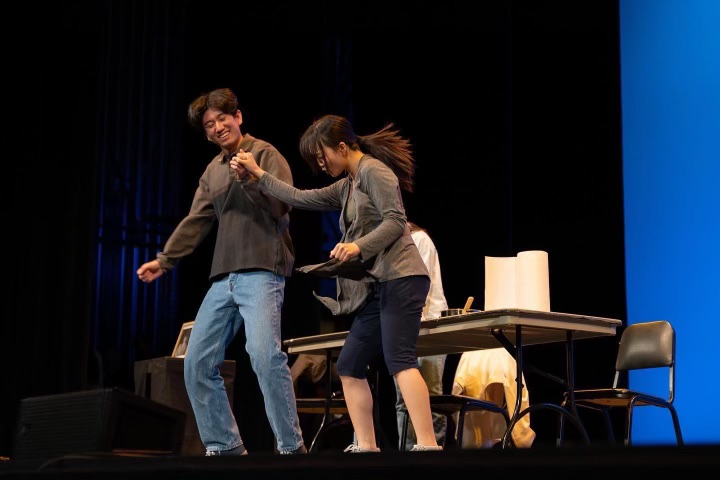UCLA’s 31st annual Korean Cultural Night (KCN) “Meet Me Where I Am” took place on April 6, 2023 at 7 P.M.. The main play played upon a continuing tradition – culture shows that use a storyline with choreographed dances woven in to express important historical and social narratives that are pertinent to Korean culture.
This year’s play follows Jaewon (played by Lauren Lee), a community college student from Glendale who struggles with her mother, Sunghee (played by Natalie Sung). The two constantly argue with each other about trivial matters which contribute to larger issues, such as Jaewon’s perception that Sunghee lacks motherly affection.
However, Jaewon comes to understand her mother’s perspective as she wakes up after being caught in a storm in 1980s Korea, where she is met with a younger version of her mom and two of her mom’s friends. In this strange occurrence, she gets to see firsthand how Sunghee struggled with her own mother, who cared deeply about reputation over displaying love for her daughter. She also suffered from physical abuse from her father who was emotionally absent.
While the storyline integrates lighter comedic moments – such as Jaewon’s efforts to make sure Sunghee meets and falls in love with Eugene, Jaewon’s father – the show also deals with more serious issues, such as financial problems, immigration and generational trauma. All Jaewon has with her is an envelope with a letter that states “Meet Me Where I Am,” and this is literally what she does. Jaewon gets to interact with her mother as a teenager and understand where she is coming from. Upon her return to modern day Glendale, Jaewon develops empathy for her mother, as well as the ability to express honesty about their generational differences and struggles with affection.
In addition to the main play, the audience got to experience performances from UCLA’s K-Pop dance team (KBM dance), the Taekwondo club sport team, the KCN modern dance group, and traditional fan dance group. These performances enhanced the narrative through connections to the storyline and even allegories to the relationship between characters. One poignant moment in the traditional Korean scarf dance set included a visual of a scarf flowing from one woman to next, suggesting a handing of a letter from a mother to a daughter.
Behind the production of this grand showcase in Royce Hall was third year psychology major Lauren Lee, the director and scriptwriter, and fourth year economics major Jennifer Lim, the producer. Lee reflected upon the deeply personal element of the show.
“Although the main character experiences a different type of complicated relationship with her mom, I feel like it kind of reflected upon my relationship with my parents,” Lee said.
Lim also emphasized the importance of cultural nights in terms of a more communal experience.
“For KCN, we always make sure that our play kind of surrounds an important issue,” Lim said. “Whether it’s societal, historical, we just reflect on some kind of important aspect of Korean history or society and just educate our audience about that.”
However, the production did not come without its problems. Lim experienced much stress a few weeks before the show due to finances and staff roles actively changing.
“I think as producer, if we run into any issue or any obstacle, all the pressure and responsibility kind of falls back on my shoulders,” Lim said.
Both Lim and Lee emphasized their concern regarding the price to rent Royce Hall as the price to rent it for a night is expensive and difficult for student organizations to afford.
“There’s only so much that students can do to raise such a large amount of money for a production like that,” Lim said.
However, both executive members of KCN agreed on the impact Royce had on the show.
“Even though renting out Royce Hall is insanely expensive, just being in a large theater and having that presence and the lighting, the props, they really brought the play to life,” Lee said.
Overall, Lim and Lee felt that KCN was a successful night that filled Royce. Both Lee and Lim believed the universality of the complicated mother-daughter relationship made it fit for a wide audience, helping the cast and crew reflect on their own family bonds as well.
“It brought more understanding to me now and I felt like it’s something that I really wanted to incorporate in the play because it felt easiest to speak from personal experience,” Lim said.
Beyond expressing personal experiences, culture nights provide students with the opportunity to become part of a community and learn more about their heritage.
“Just being able to be part of this production was super cool,” Lee said. “And being able to research the different nuances and things in Korean culture was a really cool learning process, and being able to share that was also really special.”

Comments are closed.